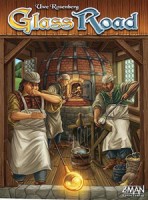
Glass Road
Overview
Over the course of four rounds, you will manage your resources and utilize the talents of certain specialists at key moments to build a small and prosperous community in the Bavarian Black forest. Victory points are scored for each structure built. The player with the most victory points at game’s end is declared the winner.
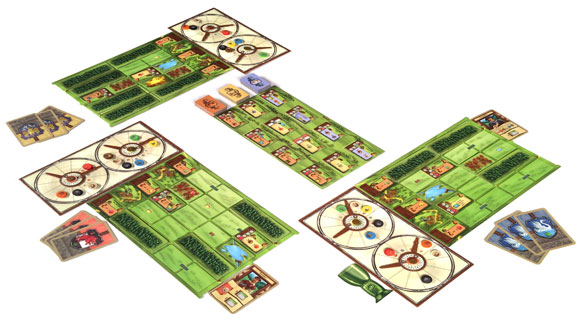
Set Up
Players each receive a Production board and a Landscape board. The Production board contains two Production wheels: a Glassworks at the top and Brickworks at the bottom. Each is seeded with a specific resource needed for producing that product: Wood, Water, Charcoal, Food and Quartz Sand for Glass; and Food, Clay and Charcoal for Bricks. Glass and Brick will be the key components for building.
The Landscape board contains a 5×5 grid which at the start of play contains certain landscape features such as forests, groves, ponds and pits. These may be cleared for building later in the game.
A Building board is set in the middle of the table and 12 buildings are randomly distributed by type among the three building type rows – they are: Processing Buildings, Immediate buildings, and Bonus buildings.
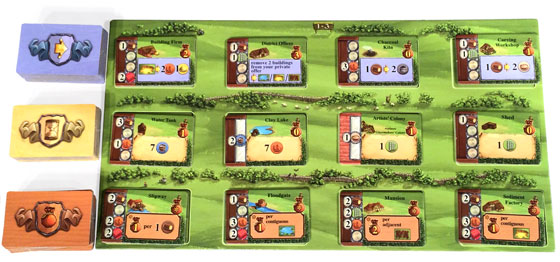
Players now take one of the identical sets of 15 specialist cards in their chosen color, randomly determine a starting player, and prepare to play.
Gameplay
Glass Road is made up of four building periods. At the start of each building period, players will choose 5 of their 15 specialist cards, place them in their hand and set the rest of the cards aside. Each Building period is made up of three card rounds.
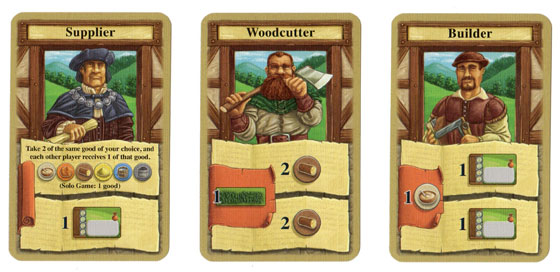
During a card round, each player will pick one card from their hand and place it face down in front of them. Then in player order, each card is revealed and resolved. For each card revealed, all other players check to see if they chose the same card in their hand as the one revealed. If so, they must play and resolve their copy immediately. Each Specialist card has two abilities on it. If the player who plays the card is the only one to have that card in their hand, they may use both abilities on the card. However, if another player has the card in their hand, they must reveal the card and may perform one action on it. This effectively gives another player a free card play while limiting the acting player’s actions on the played card to one.
Most specialist cards give players resources which they mark on their Production wheels. Some allow a player to build, spending resources from their production wheel to choose a building from the Building board and place it onto their Landscape board.
Buildings are the main focus and source of victory points in the game. Each will take a variety of resources to build. There are three “starting” buildings on each player’s Landscape board. Players will replace Landscape tiles with buildings to earn abilities and victory points.
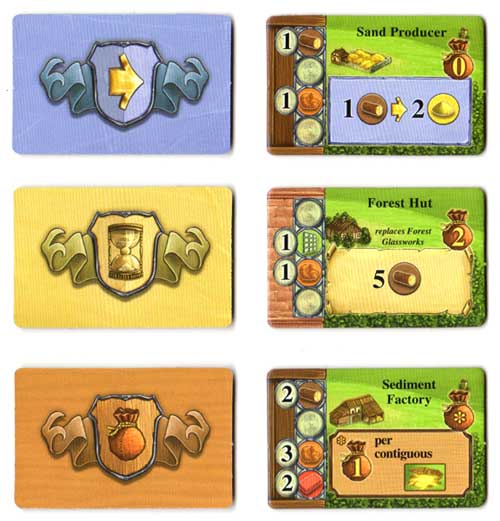
Processing buildings allow a player to trade one resource for another. Immediate buildings will grant a one-time effect. Bonus buildings will grant bonus points at the end of the game if certain accomplishments are met. Most buildings have a victory point value (in the “bag o’ money” icon). This may be an immediate motivation for players, however the Bonus buildings will often become the focus of player strategy, steering a player toward these greater rewards that multiply points based on in-game acquisitions.
Once three card rounds end, buildings are refilled on the Building board, the start player Goblet is passed to the next player clockwise, and players prepare for the next Building period by once again choosing 5 cards out of their total 15 Specialist cards.
After four Building periods, points are totaled from buildings and Bonus buildings that met their scoring requirements. The player with the most points wins the game!
Components
As with all Z-man Games, the component quality is top notch. The cardboard tiles are chunky and easy to read. Production wheels are sturdy and smooth. Cards are firm and with no shuffling required, will hold up indefinitely. A solid, weighty game. Excellent illustrations by Dennis Lohausen make the game friendly and familiar. The rule book is sprinkled with tips from the game designer, and is slightly difficult to follow but to its credit has extensive appendices for the specialist cards and the building tiles. Very useful.
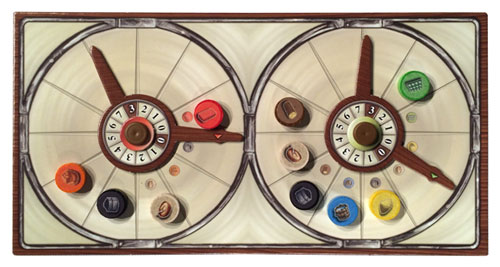
Learning Curve
Medium. The rule book is relatively well written – although the print is quite small. The actual gameplay actions are simple: choose and play a card, then resolve actions or purchases that result. However, as the game continues and building and purchase options increase, affects multiply and players are faced with a multitude of strategic choices.
Who would enjoy this game?
Final Thoughts
The beauty of Glass Road is its simplicity. Uwe Rosenberg has very effectively taken the principles present in his other games, and crafted a game that forces players to divide their strategic focus. This is the feature that makes this game different and challenging.
By expanding his production wheel mechanic (to two wheels) he divides players’ resources and in-game goals. This creates the new dynamic of resource balancing. The basic resources Food and Charcoal are present on both production wheels. In addition, the wheels don’t automatically advance each turn as in Ora et Labora. Only when a player produces goods on the bottom half of the wheel, does the glass and/or brick get produced. When the wheel turns it instantly consumes your other goods. Ingenious. And so, not only is it crucial to gain basic resources and balance their use wisely, but maintain awareness of those goods that will be consumed when your production wheel cranks out some glass or brick. Finally, Building tiles also split players’ attention between three different types: those that manipulate in game resources, those that offer immediate rewards, and those that provide a long term strategic focus which grant bonus points at the end of the game. The many different building effects also provide amazing replay value. The multiplicity present in these mechanics allows a fresh and sometimes puzzling game experience.
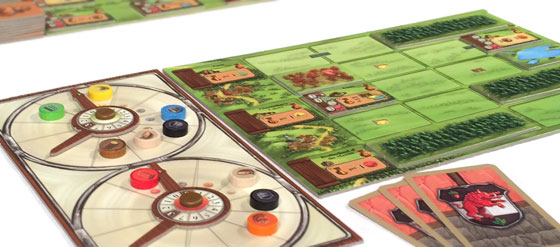
With every player having access to the same Specialist cards, the simultaneous action selection creates remarkable player interaction. However, it is the unique way the cards are played that sets up an interesting strategic position. With 5 cards to play, and only three rounds, the best way to get more actions from your cards is hoping that other players play cards that match your hand, causing you to play the matching card. This limits the other player to one action instead of two and effectively gives you a free card play. However, you don’t want to match anyone else’s cards when it’s your turn to play. Each Specialist card has two possible actions, so players quickly realize they may not gain both actions if they don’t have a handle on the other players’ strategies. This eliminates a “multiplayer solitaire” feel and really forces players to key into what they think other players are going for.
This game is remarkable and elegant. It combines the familiar aspects of Rosenberg’s previous games and distills them down into something palatable. It plays quickly and takes up little space (compared to Agricola and others). There is so much great gameplay experience in such a small package. The mistake would be to dismiss Glass Road as just another Euro. It really does break new ground in several areas. As you take your trip down the Glass Road, each trip will be a challenging yet memorable one.
User Reviews (5)
Add a Review for "Glass Road"
You must be logged in to add a review.


In Glass Road, you produce glass and brick from several basic resources and then use your resources to construct buildings and develop your own glass-making town. You might feign cast a wistful eye at the other gaming tables with their space battles and painted minis — except that your attention will be fully absorbed in mentally navigating the delightfully complex decision trees of manufacturing glass as efficiently as possible.
Gameplay
Each player has a deck of action cards and a player board. You play action cards to gather resources; clear forests, ponds, etc. from your board; and consume resources to construct buildings on cleared board spaces. Buildings open new avenues for acquiring resources and provide victory points.
Every player starts a “building period” with the same 15 action cards, secretly chooses a hand of 5, and sets the others aside. At round start, everyone secretly chooses 1 of their 5 cards and sets it facedown. On your turn, you reveal and play your facedown card. After 3 rounds, a new building period begins and everyone secretly chooses a new hand of 5 cards from their 15.
Why the secrecy? Each card has 2 actions: If you reveal the card and no one else has it, you get both actions; but if another player has the same card, you get only 1 of the actions and then the other player gets to play 1 of that card’s actions out of turn. Thus, to get the most out of your action cards you want to play cards that no one else will choose and then round out your hand with cards that others will likely play.
Winning
To win, you want the most victory points. VPs are awarded at game-end, primarily from constructing buildings that grant VP bonuses. E.g., a building will grant bonus VPs for stockpiling glass or planting adjacent forests. Piggyback onto opponents’ action cards and avoid giving them the same opportunity to more efficiently maximize your VP bonuses or simply out-build your opponents.
Theme
Fabricating glass and brick forms the backbone of Glass Road’s theme, and pastoral artwork of forests, buildings, and old-timey woodcutters fits the milieu.
Components
Glass Road replaces wood or cardboard resource bits with resource dials. E.g., when you gain 5 coal, instead of taking 5 coal chits, you move the coal marker on your dial up 5 spaces. The dials cleverly visualize glass and brick production because as your basic resources shift up the dial, you turn it to simultaneously consume basic resources and produce glass or brick. The dials, player boards, and building tiles, are made of sturdy cardboard.
Pros:
+ Action-card piggybacking and a common pool of buildings reward careful planning around other players’ strategies in addition to your own.
+ Abundant buildings, drawn randomly each game, encourage new strategies and boost replay-value.
+ Resource dials streamline game setup and resource-piece juggling while cleverly visualizing the game’s glass and brick resource mechanic.
+ Quick setup and (potentially) short play time facilitate playing in between other games or within schedule constraints.
Cons:
– Complex player decision-trees will perplex indecisive players and inflate play time significantly.
– Glass-making theme might deter players looking for a more colorful or exciting backdrop.
INTRODUCTION
Glass Road takes place in the 19th century during the rise of the brick and glass making industries in Germany. These industries used new production methods to revolutionize brick and glass making. The Glass Road refers to the 150 mile long path through the Bavarian Forest on the Czech border where these new industries sprang forth. The theme is fairly well represented in the game. Players will strip the landscape to construct buildings and use the talents of specialized workers to produce glass and brick. The object of the game is to acquire the most victory points (VPs) by constructing buildings and producing glass, brick and other products. Glass Road is for 1 to 4 players ages 13 and up and plays in a little over 60 minutes. Glass Road is at its best with 4 players and also has a very good solo variant.
COMPONENTS
The components are very good. The player boards are thick cardboard and colorful. There are thick cardboard tokens and wood playing pieces. The text on the tokens is slightly on the small side but still playable. The regular size cards are durable linen stock with average artwork which sets the theme. The rulebook is poorly written and organized. The rulebook is my one complaint with the components. The rules are unclear on many aspects and make the game mechanics seem far more complicated than they really are.
SET UP
Set-up for Glass Road is fairly quick and easy. Each player receives a Landscape and Production Board and a set of 15 Specialist cards. Terrain and Good tokens are placed in the indicated starting spaces on the Landscape and Production Boards, respectively. The Building tiles are separated into three stacks consisting of Production Buildings, Immediate Buildings and Bonus Buildings, and placed faced down. The starting buildings for each stack are drawn and placed face up on the Building Board. Players determine a starting player and you’re all set to begin.
GAME MECHANICS
Glass Road is played over four Building Periods with each Building Period consisting of three Rounds. Each player secretly selects five Specialist cards out of his set of 15 at the beginning of a Building Period. At the beginning of each Round, players secretly select one of the five Specialist cards and place it face down in front of him. Starting with the first player, and proceeding clockwise, each player reveals their card and resolves it. When a player reveals his card, the other players may play a copy of the card from their hand as well. Each Specialist card has two abilities. If no other player played a copy of the card, then the player who revealed it may use both of the card’s abilities. If at least one other player played a copy, then all involved players may use only one of the card’s abilities. In turn order, each player adjusts the resources on his Production Board and/or constructs buildings on his Landscape Board. The other two Rounds are played similarly except players choose cards to play from their remaining hand.
The Specialist cards produce resources such as food, water, charcoal, wood, clay and sand. I’m not going to review all the Specialist card actions, but suffice to say that usually a player pays a resource or strips a forest token off his Landscape Board to produce other resources. Some resources are collected depending on the number of ‘mini-terrain’ (groves, pits and ponds) tokens a player has on their Landscape Board.
Some Specialist cards allow a player to construct buildings. A player pays the resources indicated on the building token and places it in an empty slot on their Landscape Board. Buildings have one ability and are worth VPs. Production Buildings usually allow a player to transform 1 resource into 2 of another resource. These buildings can be used throughout the game. Immediate Buildings are similar but grant its ability one-time only when constructed. Bonus Buildings generally have a condition which the player needs to meet to score additional VPs at the end of the game.
Resources are tracked on the Production Board. The Production Board has a glass production wheel and a brick production wheel, each divided into two areas. One area contains a manufactured good, either glass or brick, and the other area consists of base resources such as wood, water and etc. Players shift the amount of base resources according to their Specialist card play. When the player has accumulated a certain amount of base resources, the production wheel will automatically shift, reducing the amount of all base resources to produce either glass or brick.
The game ends once the fourth Building Period has been completed. Players tally up the number of VPs from the amount of glass, brick and sand on their production wheels, constructed buildings and any Bonus Buildings. The player with the most VPs is the winner.
The solo variant plays similarly to the normal game. There are seven Building Periods in which you chose the indicated number of Specialist cards according to a table. One card is chosen at random which grants one ability. Then all but one of the remaining cards is played giving both abilities.
THOUGHTS
Glass Road was developed by a renowned designer but flew under the radar because its release was sandwiched between two of the designer’s other great games. However, Glass Road certainly lives up to the designer’s standards! Glass Road is a heavy game which will take a few plays to grasp strategies. This game throws players right into the thick of it from the start and is very unforgiving. Four Building Periods seems like a lot of time but players can’t afford to mess around because the window of opportunity to construct buildings disappears quickly.
Mastering the movement of the production wheels is a skill which takes a few plays and the key to the game. Players need to learn how to manipulate the shifting of the production wheels so as not to leave themselves without one or more of the precious base resources. Otherwise you could find yourself without a resource such as wood and have to waste a building construction action because all the buildings require wood to construct. Believe me when I say your first few plays will involve a few ‘Oh-No!’ moments!
Glass Road is all about planning. There are no workers to place. There is no luck in the game. There is virtually no player interaction. At the most, another player can construct a building before you had the chance to grab it. No, it’s just you against those darned production wheels! You’ve got to figure out which Specialist cards to use and in what order to manipulate the production wheels. You also need to lay out your mini-terrain and buildings on your Landscape Board to maximize VPs.
Don’t get me wrong, Glass Road may be a challenging game, but it is a lot of fun! This game was a surprise hit with my gaming group and still regularly makes it to the table. The solo variant is very good, playing in about 20 minutes and capturing the feel of the regular game. Glass Road would make an excellent addition to any avid and power gamer collection.
I found this gem at a local game store here in Sacramento today. I picked it up due to seeing this review. I must say I am not disappoint. It’s a euro style resource management game where you need to balance resourced in order not to loss them.
While reading through the general rules and knowing that this game is 1-4 players I thought to myself “this game will be way to easy with 2 players or solo”. I then proceeded to read the solo rules. Highest score is 17 so far! The game is well thought out on balance of resources. And because it’s played in 4 phases you can’t just stack resources and build like crazy.
I’ve recently played a few more games (2, 3 and 4 players) and must say it’s an instant favorite amongst my friends and myself. The rules are real easy to learn yet there is slight depth in the game play. Along with some slight strategy and great balance this game is great regardless if you play solo or with 2-4 players. Extremely fun and the quality of product is great in my opinion.
Hey guys,
We are ‘The Misery Farm’, 3 Ladies, an assortment of generic gaming buddies, and a*uva lot of games. Here you’ll find humourous, sarcastic, or just plain drunk reviews of board games and board game-related stuff.
We’ve recently reviewed Glass Road, which you can read here http://themiseryfarm.com/2015/03/29/glassroad/
We welcome any comments or feedback, and we hope you enjoy it!
While I thought the game was well done, the instructions could have been a little simpler. I have played this game twice, the second time with friends that had played it once before. They didn’t fully understand all the rules and the one time buildings, they were playing their effects every turn, until I pointed out that they were for one use only. The rules were not that clear on many of the concepts. For example, I was wondering how you get glass and brick until the game was into the second building phase. I couldn’t find it in the instructions on how you get glass and brick, until I read again about the production wheels. I missed out on a lot of glass and brick. My wife played it with us at that time, and she thought it was very unclear, and she is a retired high school teacher! Once you know how to play it, it plays well, and I like that dice are not present in the game. The only luck involved is whether or not you can get the building you want before someone else snatches it.